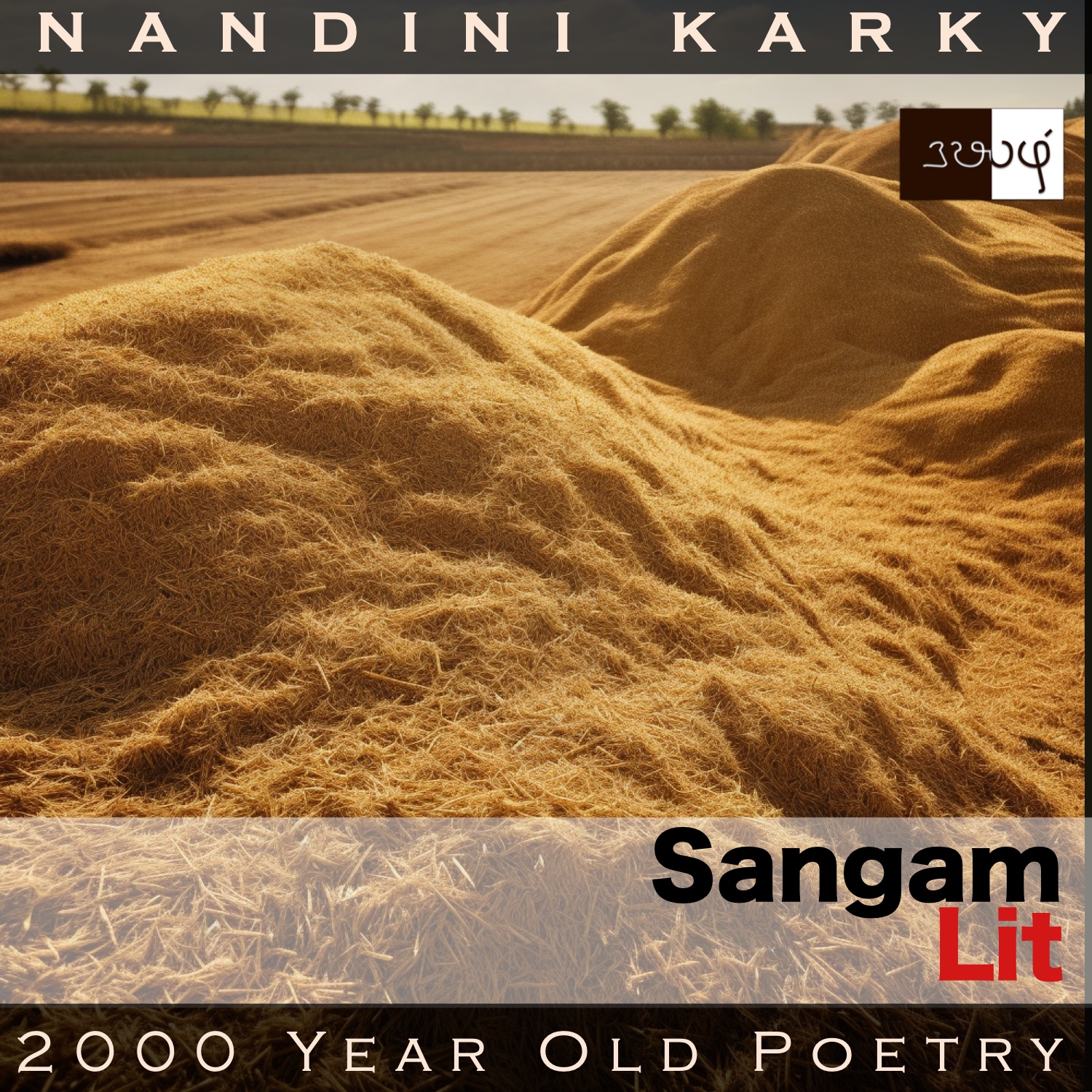Podcast: Play in new window | Download
Subscribe: Apple Podcasts | Spotify | Amazon Music | Android | iHeartRadio | TuneIn | RSS | More
In this episode, we perceive the peace and prosperity in the rule of a king, as depicted in Sangam Literary work, Puranaanooru 230, penned about the Velir King Athiyamaan Nedumaan Anji by the poet Arisil Kizhaar. Set in the category of ‘Pothuviyal Thinai’ or ‘Common Themes’, the verse echoes the helplessness experienced by the world upon the demise of this king.

கன்று அமர் ஆயம் கானத்து அல்கவும்,
வெங் கால் வம்பலர் வேண்டு புலத்து உறையவும்,
களம் மலி குப்பை காப்பு இல வைகவும்,
விலங்கு பகை கடிந்த கலங்காச் செங்கோல்,
வையகம் புகழ்ந்த வயங்கு வினை ஒள் வாள்,
பொய்யா எழினி பொருது களம் சேர
ஈன்றோள் நீத்த குழவி போல,
தன் அமர் சுற்றம் தலைத்தலை இனைய,
கடும் பசி கலக்கிய இடும்பை கூர் நெஞ்சமொடு
நோய் உழந்து வைகிய உலகினும், மிக நனி
நீ இழந்தனையே, அறன் இல் கூற்றம்!
வாழ்தலின் வரூஉம் வயல் வளன் அறியான்,
வீழ் குடி உழவன் வித்து உண்டாஅங்கு
ஒருவன் ஆர் உயிர் உண்ணாய் ஆயின்,
நேரார் பல் உயிர் பருகி,
ஆர்குவை மன்னோ, அவன் அமர் அடு களத்தே.
In the line-up of Sangam obituaries, the next king to be mentioned is the famous Athiyamaan, who ruled over Thakadoor, and also was referred to by his clan name – Ezhini. This was the king much celebrated by the prolific female poet of Sangam times – Avaiyaar. Here, the poet Arisil Kizhaar expresses his anguish on hearing about the loss of this king through these words:
“Providing a safe haven wherein cows with calves grazed peacefully in the forest, wayfarers with blistering feet rested and recovered even in the drylands and crop grains were left unguarded in the field, flourished the rule of Ezhini, celebrated by the whole world and renowned for repelling strong armies, holding an unswerving sceptre, possessing a well-crafted, shining sword and never swaying from the path of truth.
As he fought and fell on the battlefield, this world, akin to a newborn, which has lost its mother, that cries again and again amidst its relatives, is now in a state of terrible hunger, with hearts filled with anguish and in a deep affliction. Even more than such a suffering world, you have lost much more, O unjust Death! You are like that downtrodden farmer, who does not realise the benefit his future crops would bring and eats up his last crop-seeds. Had you not devoured the single, precious life of this king, wouldn’t you be feasting on the lives of his enemies many in the battlefields he attacks?”
Let’s delve deeper into this verse. The poet starts by describing how peace reigned supreme in the land ruled by Ezhini. Here, cows could leave their calves and go graze at peace in the forest. Wayfarers who normally suffer a lot in the drylands, owing to thirst, hunger and fear of attack by bandits, in the domain of Ezhini, not only have to fear these elements, but they have avenues to rest and heal from their arduous journey. Next example to illustrate this peace is the way mounds of crop grains are left in the fields with no protection. There is so much prosperity that no one is going to steal from these unguarded belongings of others, the poet implies. After sketching the good governance in the domain, the poet now turns to describe the king himself, calling him a person of his word, known for his courage in the battlefield and for his battle weapons.
Now, the poet mentions that such a king has fallen and the state of the world is exactly like that of a baby that has lost its mother, and cries ceaselessly amidst its relatives. He turns to Death and declares that Death is in a worse state than that crying world. To explain how, the poet brings forth the simile of a farmer eating his crop-seeds in an act of desperation, not thinking of future bounty from his fields, a simile we have already seen in another Puranaanooru verse. The poet concludes by telling Death that had it not taken away the life of this king, then it would have had the opportunity to feed on the lives of this king’s enemies in the battlefield.
Although the latter half sounds familiar because of that repeated simile, the poem still holds a lot of novelty in describing the peace in the king’s land and the state of the world after his end. The earlier scenes of comfort and the later tears of the crying child make this a poem brimming with emotions, expressing the grief in loss.




Share your thoughts...